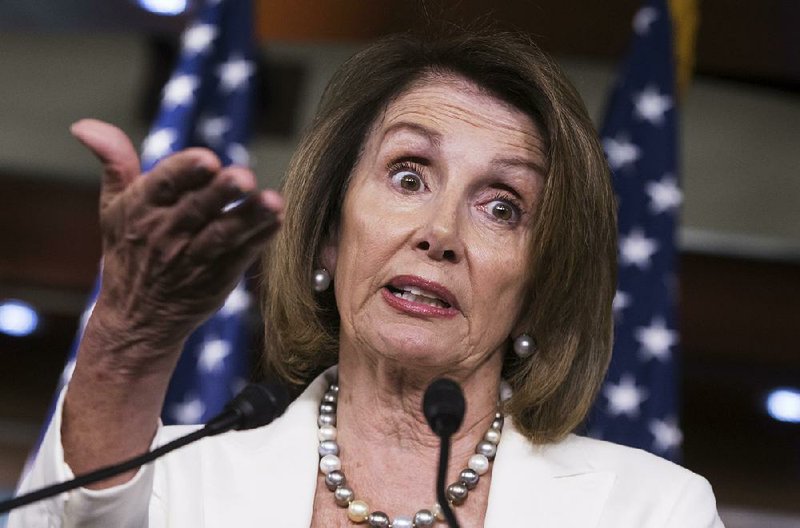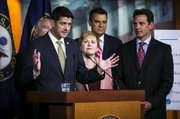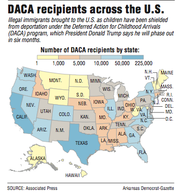WASHINGTON -- The fate of 800,000 young illegal immigrants hung in the balance Thursday as top lawmakers, White House officials and President Donald Trump gave varying statements as to whether an agreement had been struck to protect them -- and if so, exactly what it was.
In the face of backlash from conservatives inside the Capitol and out, Speaker Paul Ryan and other GOP House members insisted that there was no agreement to enshrine protections for the immigrants brought to America as children and now here illegally.
John Cornyn of Texas, the No. 2 Senate Republican, put it this way: There was "a deal to make a deal."
Trump announced last week that he was ending former President Barack Obama's Deferred Action for Childhood Arrivals program, which has granted temporary work permits and deportation relief to the hundreds of thousands of immigrants brought across the border as minors. He gave Congress six months to come up with a solution before the protections would end.
On Thursday, Trump said he was "fairly close" to an agreement that could protect the program's participants while also adding border security, as long as his long-promised wall with Mexico was also separately addressed.
As he left the White House to visit flood-damaged Florida, Trump told reporters, "We're working on a plan for DACA" -- an acronym for the deferred-action program. He added that "the wall will come later."
Democratic leaders Nancy Pelosi and Charles Schumer -- whose Wednesday night dinner with Trump was at the heart of the dispute -- insisted there was discussion and even agreement on legislation that would offer eventual citizenship to the immigrants in question.
"We agreed it would be the DREAM Act," Schumer told reporters, referring to a bipartisan bill that would allow illegal immigrants brought to the U.S. as children to work their way to citizenship in as little as five years if they meet certain requirements.
[U.S. immigration: Data visualization of selected immigration statistics, U.S. border map]
But Trump appeared to contradict that later while en route to visit with Floridians.
"We're not looking at citizenship, we're not looking at amnesty. We're looking at allowing people to stay here," Trump said.
He had questioned in a pair of tweets Thursday morning whether anyone actually wanted to deport the young immigrants.
"Does anybody really want to throw out good, educated and accomplished young people who have jobs, some serving in the military?" he wrote, adding that they "have been in our country for many years through no fault of their own."
[PRESIDENT TRUMP: Timeline, appointments, executive orders + guide to actions in first 200 days]
What was clear was that the outcome for the deferred-action program participants themselves was still unresolved -- and that the politics of immigration, which has defeated Congress for years, remained as tricky as ever.
After winning the White House on a campaign that was harsh toward immigrants and revolved around the construction of a wall along the entire border with Mexico, Trump's sudden pivot infuriated some of his closest allies.
"He was so explicit during the campaign on the issue of the border wall and border security that if he were to backtrack on that promise I don't think he'd have a single friend left in the country. Democrats aren't going to support him and he would lose the entire Republican base," said Rep. Tom McClintock, R-Calif. "This was a core, explicit and graphically clear promise he made to the American people."
"At this point, who DOESN'T want Trump impeached?" conservative commentator Ann Coulter remarked on Twitter.
Breitbart News, the conservative website now run by former White House chief strategist Stephen Bannon, quickly became a gathering place for aggrieved Trump backers. Readers congregated by the thousands in the comments section for an article with a bright red headline: "Amnesty Don."
Administration officials quickly recognized the danger in the backlash, and the White House shifted into damage-control mode, with press secretary Sarah Huckabee Sanders denying a deal had been struck or the wall excluded from it. Some also wondered aloud Thursday whether the president was aware of the minutiae of the DREAM Act legislation discussed Wednesday, including the fact that it includes an eventual path to citizenship.
Despite Trump's insistence Thursday that a path to citizenship and amnesty weren't on the table, two people briefed on Wednesday night's proceedings said citizenship was explicitly mentioned when Democrats raised the DREAM Act.
Budget Director Mick Mulvaney, who attended the Wednesday night dinner, spoke up to say that the bill does include a pathway to citizenship, according to the people briefed, who spoke on condition of anonymity to disclose the private proceedings.
Mulvaney spokesman John Czwartacki said the Office of Management and Budget director does not recall using that specific phrase, but does remember pointing out the distinction between the deferred-action protections and the DREAM Act.
LAWMAKERS WEIGH IN
Whether or how Trump digested Mulvaney's explanation was unclear, but the posture struck by Ryan and others on Capitol Hill seemed designed to protect the president from a backlash from his conservative base.
Ryan disputed the idea that any deal had been struck, though his argument seemed to turn largely on semantic distinctions.
"These were discussions, not negotiations; there isn't an agreement," Ryan said. "The president wasn't negotiating a deal last night. The president was talking with Democratic leaders to get their perspective. I think the president understands that he's going to have to work with the congressional majorities to get any kind of legislative solution."
Majority Leader Mitch McConnell, R-Ky., remained noncommittal about a possible deal and put the onus on the White House to come up with a proposal.
"As Congress debates the best ways to address illegal immigration through strong border security and interior enforcement, DACA should be part of those discussions. We look forward to receiving the Trump administration's legislative proposal as we continue our work on these issues," McConnell said in a statement Thursday.
For their part, immigration activists reacted cautiously to news of the deal, with several saying that any celebration would be premature. Many immigrants have been consumed by worry since Trump's announcement of his plan to end the deferred-action program.
In New York, activist Martin Batalla Vidal, who came to the U.S. with his parents when he was 7, said he has taken college classes, does "meaningful" nursing home work and pays taxes. He spoke at a rally by civil-rights groups.
Rep. Ruben Gallego, D-Ariz., a leader of the Congressional Hispanic Caucus, said the caucus hasn't seen any details, and "we're not going to trade the protection of [the deferred-action program participants] for the deportation of others."
"I don't think the president actually understands what he's saying half the time," Gallego said. "So I'm afraid that if you strike a deal with him, that he'll go back on his word at any point."
But some immigration advocates in the Senate cheered him on.
"The president is trying to cut a deal that I think would be good for the country as a whole. He is not the president of 15 percent of the population. He is the president of all of us," said Sen. Lindsey Graham, R-S.C., a consistent advocate of legislation to legalize many illegal immigrants. "And if he could bring Democrats and Republicans together to find a place for these kids to stay in the country they know, and secure our border, that would be a giant step forward."
If a deal risks alienating the president's base, said Sen. Jeff Flake, R-Ariz., another immigration advocate, so be it.
"I think he ought to do the right thing, and the right thing is to protect these DACA kids," he said.
Trump has appeared to embrace his newfound luster as a bipartisan deal-maker since a disaster-and-debt deal he struck with Pelosi and Schumer last week stunned Washington and garnered a stack of positive headlines.
Schumer, too, has relished the deal-making; he was caught on a live microphone on the Senate floor Thursday gleefully telling McConnell, "He likes us! He likes me, anyway."
Information for this article was contributed by Erica Werner, Jill Colvin, Jonathan Lemire, Kevin Freking, Andrew Taylor, Alan Fram and Matthew Daly of The Associated Press; by Elise Viebeck, Ed O'Keefe, Mike DeBonis, Paul Kane, Kelsey Snell, Robert Costa and Karoun Demirjian of The Washington Post; and by Sheryl Gay Stolberg and Yamiche Alcindor of The New York Times.
A Section on 09/15/2017


